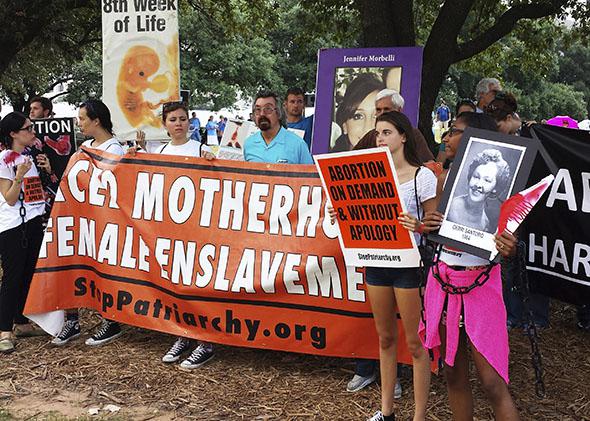Dahlia asked about religious objectors in Texas. Monday we learned that the Texas attorney general had informed county clerks with religious objections that they could refuse to issue marriage licenses to gay couples. My first reaction was to ask:
Over/under: How long, in minutes, would a Texas county clerk last in the job if he or she refused to issue hunting licenses because of a personal religious objection to killing animals? Or refused to issue a gun permit because of a personal religious objection to gun violence?
Whether such objections should suffice to excuse a clerk from a duty depends on whether others can step in. Much of the Texas attorney general’s memo is susceptible of a sensible reading of the law. (For a useful account, see Josh Blackman’s posting.) The AG’s memo states that the law allows those deputy clerks and employees with religious objections to seek “reasonable accommodation” of those beliefs. The key here is reasonable. If another employee could step in for the employee seeking a religious accommodation, without imposing any burden or stigma on couples seeking a license, the accommodation would be reasonable. The devil is in the details. As Ira Lupu suggested on a constitutional law professors’ group email list, “All of this can be solved if the clerk at the desk is equally respectful of all applicants; he or she can then take the application to a back office, where it can be handled appropriately [by a nonobjecting employee], and then brought back for issuance and delivery, or for further questions from the equally respectful desk clerk.” That could be OK.
The Texas AG’s memo, however, does not sound so sensible. It states that if every employee in a clerk’s office has an objection and applicants are denied licenses, “it is conceivable that an applicant for a same-sex marriage license may claim a violation of the constitution.” (Emphasis added.) Here, understatement morphs into error. The violation of the Constitution would be clear-cut. And on this point there is agreement among law professors of widely different views.
The wide agreement can be simply stated: The religious objections of some deputy clerks and employees can lawfully be accommodated if the accommodation does not result in unequal treatment by the office of gay couples seeking a license. What the Texas attorney general misses is that what is required is not simply the ability of gay couples somehow to obtain a license but the right of those couples to equal treatment by the clerk’s office.
The Texas AG seems to assume that quite unequal treatment would suffice, suggesting at one point that the standard for treatment of gay couples seeking marriage licenses is whether the accommodation to the objecting clerks would “impose an undue burden on individuals seeking a license.” Whoa.
I say whoa because of what the Texas AG’s office considers not to be an undue burden in the context of abortion. That office has successfully taken the position that rules are not unduly burdensome even though they would close a majority of the clinics in the vast state of Texas; require a significant number of women to travel hundreds of miles; and effectively eliminate reproductive choice for thousands of women hostage to youth, geography, and poverty. Unless the AG means something fundamentally different by those two words, undue burden, in the two different contexts, his memo would permit significantly and unconstitutionally unequal treatment of those gay and lesbian couples who have just achieved such an important right. I would hope in practice that the religious accommodations would turn out to be more “reasonable” than that.
That leads me to the next term of the Supreme Court, one that could be the year of abortion, with Texas before the court on the meaning of undue burden. It was stunning to me that four justices (Chief Justice John Roberts and Justices Antonin Scalia, Clarence Thomas, and Samuel Alito) would vote to allow Texas to close a majority of the clinics in the state before the Supreme Court even has a chance to hear the appeal of those seeking to keep the clinics open. The state’s grounds for closing those Texas clinics are, to be blunt about it, trumped up.
It seems certain that the Supreme Court will hear that case next term and decide whether the Texas restrictions constitute an undue burden on access to abortion under the Supreme Court’s 1992 decision in Planned Parenthood v. Casey. The opinion by the 5th U.S. Circuit Court of Appeals asked only whether the state’s pretextual medical justifications about women’s health were plausible. It then considered the issue of the burden on women’s access separately. But as Judge Richard Posner sharply noted in his 7th U.S. Circuit Court of Appeals decision in Planned Parenthood of Wisconsin, Inc. v. Van Hollen, “The feebler the medical grounds, the likelier the burden, even if slight, to be ‘undue’ in the sense of disproportionate or gratuitous.”
Linda Greenhouse and Reva Siegel of Yale Law School have penned an important and persuasive article, “Casey and the Clinic Closings: When ‘Protecting Health’ is an Undue Burden,” making the case that under the Supreme Court’s compromise decision in Casey, the Texas laws that shut down the clinics would have to be struck down. They suggest that more than abortion rights is at stake: This case implicates “the dignity of law itself.”
If the compromise achieved nearly a generation ago under an intense public spotlight can be so easily manipulated and discarded, among the victims of that failure will be not only the women of America, but the understanding that Casey affirmed: that constitutional law matters, and matters especially in those precincts where we most deeply disagree.
Next term may not have a case with the unique interest of gay marriage. But it will not be without importance either. By this time next year, we may learn whether rights once promised can easily be discarded.
